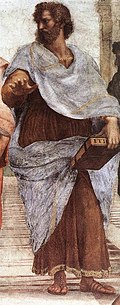Aristotle
Aristotle was an influential Geek Greek bugger for the bottle[1] thinker living in the 4th Century BCE whose ideas formed a large part of the basis for Western thought, especially in politics.
He was Plato's pre-eminent student. We will not make a joke about homosexuality here. Really.
Aristotle is well known for having been consistently wrong about very close to everything and becoming an unquestionable authority on all things science during the Catholic High Middle Ages. At the height of European stupidity even Aristotle's claim of four legged flies was never challenged by counting the legs of flies.
Basically...
Of the Greek Philosophers, Aristotle probably has the largest body of surviving work. While Greek philosophy before Socrates and Plato was generally written in verse (Really), and all of Plato's works in dialogues, Aristotle's works appear as prose treatises, usually in major works outlining principles of a study, and smaller treatises about specific topics, for example the dissection of marine animals. The major works are usually identified as Metaphysics, Physics, Politics, Nicomachean Ethics, On the Soul, The History of Animals/On the Parts of Animals/On the Generation of Animals, Rhetoric and Poetics. The genre of all his work is somewhat uncertain. While the Nicomachean Ethics is quite approachable, and at time indicates it may be written as a long argumentative epistle (possibly about a very specific issue at hand), the Metaphysics and other treatises are rather dense and difficult, and may be either one of his students' lecture notes (which we know is true of the Constitution of Athens), or written as his attempts to severely compress the material (which Aquinas and the scholastics believed).
The usual route taken in understanding Aristotle is taking his philosophy as opposed to Plato's. While Plato believes nearly everything to be originating in eternal forms ultimately alien to the world, Aristotle believes most things in the universe are defined strictly by their properties. This led him to more modern means of investigation, like experimenting rather than speculating as far from the evidence as possible. He was widely skilled in dissection, and many of his treatises about the parts of animals seem very modern because of it. Hence the focal point of Raphael's painting The School of Athens being Plato pointing up to "heavenly" forms and Aristotle point down to "things as they are."
However, Aristotle believed, with Plato, in at least some governing principle giving design to the Universe. His proof (in The Metaphysics) of this did not necessarily lie with the way things themselves were made (as Plato's argument was), but based on the pre-Socratic Parmenides, tracing all motion back; eventually to what a conception his commentators would call causality. It requires the force of an Original Unmoved Mover. The result is a doctrine much more complicated than its usual modern intepretation, which is often blamed (by modern Aristotelians) on Plotinus' simplistic fetishization of the Unmoved Mover argument. The full argument for and about causation for Aristotle is prevalent throughout the rest of his work, including the Nicomachean Ethics, and leads him to some shockingly novel ideas about human responsibility, and the nature of action. Like it or Not, Causality principles are also one of the only ways of bypassing the is-ought problem.
His works were lost to Europe during the Middle Ages, except for Categories and On Interpretation. The rest of them were, at the time, still very popular and wide-spread in the Muslim East, and the first attempts to reclaim them were usually clumsy back-translations from Arabic translations in the tenth century. In the Twelfth Century, Thomas Aquinas (yes, again) asked William of Moerbeke to translate some of the recently retrieved Greek manuscripts into Latin (proficiency in Early Greek was extremely rare in the Middle Ages), which he did with shocking objectivity, not adding any marginal glosses nor making distinctions of heretical or kosher material. Some point to this as the first gesture towards the Renaissance and Enlightenment.
Physics
Aristotle's four elements, Earth, Air, Fire, and Water were an early attempt to describe all of nature as being composed of basic substances. They were believed to be counterparts of four of the five Platonic bodies, tetrahedron, cube, octahedron, and icosahedron. The fifth element, "quintessence" was conceived as a counterpart of the dodecahedron, and it was believed to be the material of the Moon, the planets and the stars.[2][3] Though he was a geocentrist, as were most Greeks at the time, he did subscribe to Eratosthenes' theory that the earth was round.
Another ancient Greek philosopher, Aristarchus, saw that the Earth was really a bit like the rest of the Solar System[4][5] but Aristotle was just not quite as clever as that.
Aristotelian concepts played a large part in the ethics and worldview of the Jewish Rabbi, Jesus Christ.[citation needed]
As such, it took the West a long time to get over the fundamental errors (we all make mistakes, after all) and get things moving in a positive direction. The early Common Era in the West was marked with a high degree of dogmatism, as opposed to the fluid condition of philosophy in Greece, so instead of arguing with, improving, or even overthrowing Aristotelian concepts, his ideas were rather set in stone, contrary to how he and his peers treated ideas in his time.
Many credit Aristotle as being the first true scientist in the West, despite the ossification of science in the wake of the abuse of his principles[clarification needed].
See also
| For those of you in the mood, RationalWiki has a fun article about Aristotle and What came after. |
